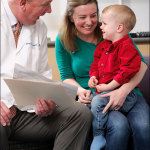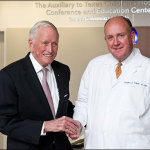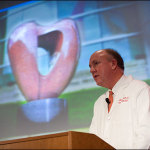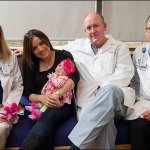 Intensivists, cardiologists, cardiovascular surgeons, nurses, and outcomes and quality experts from Texas Children’s Heart Center and Baylor College of Medicine served as presenters and moderators during the Pediatric Cardiac Intensive Care Society (PCICS) 11th International Meeting held December 9 through 11 in Houston.
Intensivists, cardiologists, cardiovascular surgeons, nurses, and outcomes and quality experts from Texas Children’s Heart Center and Baylor College of Medicine served as presenters and moderators during the Pediatric Cardiac Intensive Care Society (PCICS) 11th International Meeting held December 9 through 11 in Houston.
Nearly 300 cardiovascular experts from 13 countries met during the two-day multidisciplinary, interactive conference, which includes cutting-edge research presentations and panel discussions. PCICS is an international professional forum for promoting excellence in pediatric cardiac critical care medicine. Through programs, meetings and educational curriculums, the society has a large role in vital research and training that will improve the level of care of pediatric patients with congenital heart disease and acquired cardiovascular disease.
“I’m thrilled so many of our leading Heart Center experts presented and moderated at this year’s conference in front of an international audience,” said Dr. Paul Checchia, medical director of the Cardiovascular Intensive Care Unit (CVICU) at Texas Children’s and president of the PCICS.
Checchia, who also serves as a professor of pediatrics-critical care and cardiology at Baylor, and Dr. Lara Shekerdemian, chief of critical care medicine at Texas Children’s and professor of pediatrics-critical care and cardiology at Baylor, were program directors of the meeting. The 11 Texas Children’s Heart Center experts who presented or moderated throughout the meeting include:
- Dr. Patricia Bastero, pediatric intensive care physician at Texas Children’s and associate professor of pediatrics-critical care at Baylor, presented: Lessons Learned from Simulation: How to Keep a Safe Environment for Real Life Event Debriefings.
- Kathleen Carberry, director of the Texas Children’s Hospital Outcomes and Impact Service, moderated: Wave the Magic Wand: What do Bedside Nurses Need to Create a Safer Culture?
- Dr. Charles D. Fraser Jr., surgeon-in-chief and chief of congenital heart surgery at Texas Children’s and professor of surgery and chief of the division of congenital heart surgery at Baylor, moderated: The Risks We Used to Take: Panel of Innovators.
- Trudy Leidich, director of quality and safety at Texas Children’s, presented: Reassurance vs. Criminal Charges, How Do We Handle/Talk About Errors?
- Dr. Carlos Mery, congenital heart surgeon at Texas Children’s and assistant professor of surgery-congenital heart surgery at Baylor, presented: Congenital Heart Disease in Mexico: Building Programs and Changing Paradigms.
- Dr. Jack Price, pediatric cardiologist at Texas Children’s and associate professor of pediatrics-cardiology at Baylor, presented: Candidate Selection: Different Views from Across the Spectrum – Medical.
- Dr. Craig Rusin, cardiology research core, physiological signal processing and algorithm development at Texas Children’s and assistant professor of pediatrics-cardiology at Baylor, presented: Capturing Data in CVICU: When is Enough, Enough?
- Kerry Sembera, CVICU nurse at Texas Children’s, served on the panel: Wave the Magic Wand: What do Bedside Nurses Need to Create a Safer Culture? and presented: Improving Patient Outcomes: Just in Time!
- Shekerdemian moderated: The Future is Now: Updates on Trials and Research and present: PHN/NIH Update.
- Dr. James Thomas, pediatric intensive care physician at Texas Children’s and professor of pediatrics-critical care at Baylor, presented: Ethics in ECMO: How to Handle Difficult Cases.
- Dr. Eric Williams, medical director of quality at Texas Children’s and associate professor of pediatrics-critical care at Baylor, presented: Being Resilient: The Cardiac ICU as a Complex Socio-Technical System.
















